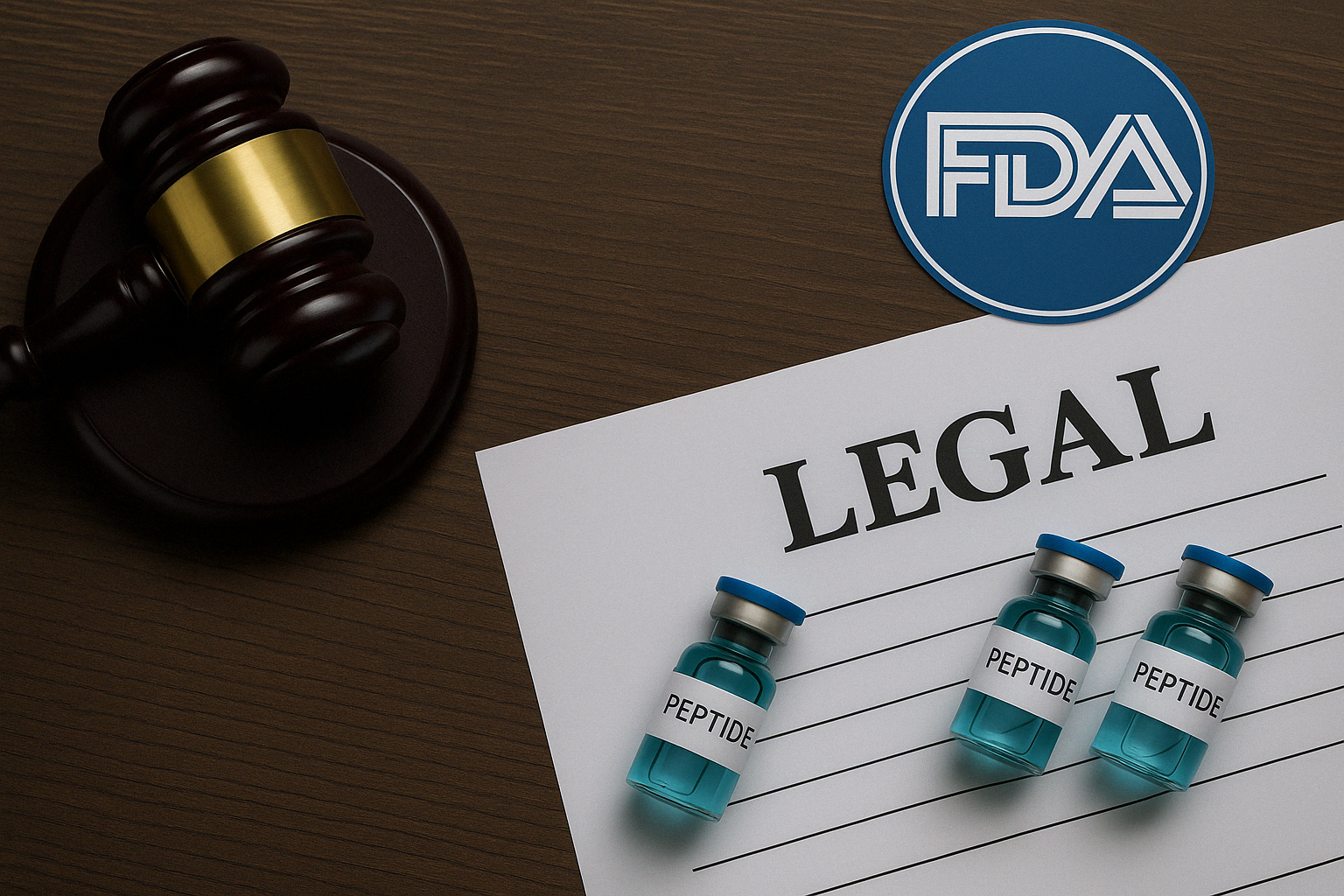Are Peptides Like BPC-157, CJC-1295, and Ipamorelin Legal? FDA & Global Laws Explained

Peptides have surged in popularity for their potential benefits in muscle growth, anti-aging, recovery, and fat loss. Among the most discussed are BPC-157, CJC-1295, Ipamorelin, and Sermorelin. But with their rise in interest has come confusion: Are these peptides legal? The answer isn’t simple—it depends on where you are, how they’re sourced, and how they’re used. Here's a breakdown of the latest FDA stance and global regulations.
BPC-157: Popular But Prohibited
BPC-157 is a synthetic peptide widely touted for its regenerative and anti-inflammatory properties. Despite promising animal studies, it is not FDA-approved for any medical use in humans. In fact, the FDA explicitly prohibits its sale as a drug, dietary supplement, or food additive, and has barred compounding pharmacies from using it altogether.
That hasn’t stopped underground markets from offering BPC-157 as a "research chemical," often labeled "not for human consumption." However, selling or using it outside a research context is illegal under federal law. The World Anti-Doping Agency (WADA) classifies BPC-157 under its S0 category for unapproved substances, meaning it’s banned in all athletic competitions regardless of intent.
CJC-1295 and Ipamorelin: Under Scrutiny
CJC-1295 and Ipamorelin are growth hormone-releasing peptides (GHRPs) used off-label for anti-aging, performance enhancement, and fat loss. In August 2024, the FDA banned compounding pharmacies from producing both peptides, citing cardiovascular safety concerns such as tachycardia and arrhythmias, along with a lack of robust human trial data.
Initially placed under Category 2 of bulk drug substances—which flags them as prohibited for compounding—the FDA removed them from that category in September 2024, pending further review. While this move doesn’t reinstate compounding access, it signals that regulators may be re-evaluating their stance by late 2024 or 2025.
Still, any sale or marketing of CJC-1295 and Ipamorelin for human use without FDA approval remains illegal.
Sermorelin: Once Approved, Now Compounded
Sermorelin has a slightly different regulatory story. Approved by the FDA in 1997 for pediatric growth hormone deficiency, it was commercially discontinued in 2008. Today, it remains legal with a prescription and can be compounded under Section 503A of the Food, Drug, and Cosmetic Act.
That said, compounded Sermorelin hasn't undergone the same rigorous safety and efficacy testing as its original FDA-approved version. Off-label use for muscle growth and anti-aging is common but not officially endorsed, and carries potential risks like hyperglycemia.
U.S. Loopholes & Research-Only Labels
A key factor in the peptide gray zone is the research-use loophole. Many peptides are sold online labeled “not for human consumption,” which allows vendors to sidestep FDA enforcement—for now. This loophole, however, doesn't make it legal to use these compounds therapeutically. Doing so can violate federal law and create serious health risks, especially due to inconsistent purity and dosing.
Global Regulatory Patchwork
Regulations outside the U.S. vary dramatically:
- European Union: Treats peptides like BPC-157 and CJC-1295 as medicines requiring EMA approval. Non-prescription sales are banned in countries like Germany and France.
- UK: Permits research-grade sales but prohibits human use.
- Australia, Japan, South Korea: Require prescriptions and enforce penalties for unauthorized sales.
- China: Research markets thrive but clinical use without authorization is penalized.
- Mexico, Brazil: Prescription technically required, but enforcement is weak.
- Middle East: Countries like Saudi Arabia and the UAE have strict bans, especially aligned with anti-doping regulations.
The Bottom Line
Whether peptides like BPC-157, CJC-1295, Ipamorelin, and Sermorelin are legal depends on how and where they’re obtained and used. In the U.S., BPC-157 is fully banned, CJC-1295 and Ipamorelin are under FDA review with compounding suspended, and Sermorelin is legal by prescription but lacks an FDA-approved product. Globally, regulations range from prescription-only to total bans.
Until clearer guidance emerges, consumers and practitioners should exercise extreme caution. Prioritize transparency, verify sources, and understand the regulatory risks before considering any peptide-based therapy.